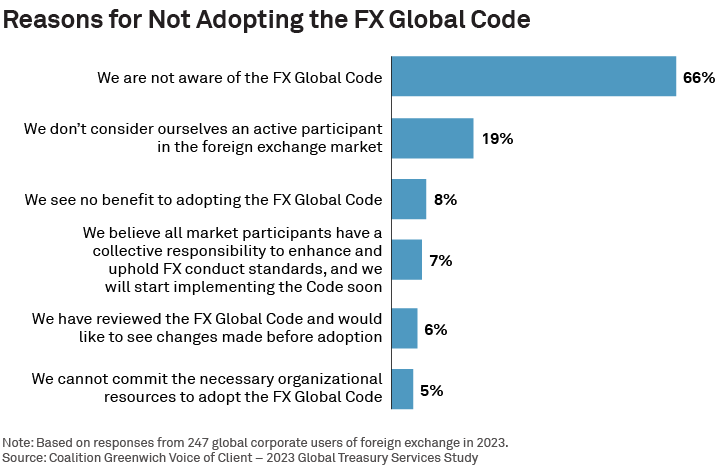The goal of the FX Global Code (FXGC) is to “promote the integrity and effective functioning of the wholesale foreign exchange market.” The FXGC covers topics ranging from operations and workflow to trading and algorithms to risk management. While each of the topics is (or should be) of great interest to corporate end users, Coalition Greenwich research indicates that corporates have not embraced the FXGC. In fact, many corporations are unaware that there is an FXGC.
Benefits of the Global Code
Only 10% of corporates that participated in our research have or intend to sign onto the FXGC. For the minority of corporates who are adopting the code, they clearly see the benefits. The most frequently mentioned reasons for adoption are:
- Fostering a level playing field between corporates and their banks
- Ensuring corporates have high governance standards
These two reasons are central to the adoption of the Code. It is designed to ensure fair outcomes for all market participants. This includes both liquidity providers (mainly banks) and liquidity takers (in this scenario, corporates). Moreover, one of the key drivers behind the Code is to foster the highest governing standards across signatories. The reach of the benefits of the Code, however, does not yet extend deeply into the corporate world overall.
Lack of Awareness
Corporate interest in the FXGC is limited, with 90% stating they have not adopted the Code. This is not necessarily due to the Code itself, but rather because 66% of those corporate end users are unaware of the Code’s existence.
Therefore, a key conclusion for any entity (be it a bank or an industry body) with a stake in extending adoption into the corporate space is to raise awareness of the Code’s existence and explain how it benefits the entire FX ecosystem, especially corporate clients.
Proponents of the Code know that they need to spend more time educating the buy side on its benefits. The Bank for Internal Settlements (BIS) recognizes this and has thus recommended educating on the three main areas of focus for the next review, stating, “Educating a broader set of market participants on the Code and increasing adoption should remain a key priority.”
Even with that education, not all end users will feel like the Code pertains to them, but a lack of awareness of the FXGC as the main obstacle can be overcome.
Stephen Bruel and Tom Jacques are the authors of this publication.
This Document is prepared by Coalition Greenwich, which is a part of CRISIL Ltd, an S&P Global company. All rights reserved. This Document may contain analysis of commercial data relating to revenues, productivity and headcount of financial services organisations (together with any other commercial information set out in the Document). The Document may also include statements, estimates and projections with respect to the anticipated future performance of certain companies and as to the market for those companies’ products and services.
The Document does not constitute (or purport to constitute) an accurate or complete representation of past or future activities of the businesses or companies considered in it but rather is designed to only highlight the trends. This Document is not (and does not purport to be) a comprehensive Document on the financial state of any business or company. The Document represents the views of Coalition Greenwich as on the date of the Document and Coalition Greenwich has no obligation to update or change it in the light of new or additional information or changed circumstances after submission of the Document.
This Document is not (and does not purport to be) a credit assessment or investment advice and should not form basis of any lending, investment or credit decision. This Document does not constitute nor form part of an offer or invitation to subscribe for, underwrite or purchase securities in any company. Nor should this Document, or any part of it, form the basis to be relied upon in any way in connection with any contract relating to any securities. The Document is not an investment analysis or research and is not subject to regulatory or legal obligations on the production of, or content of, investment analysis or research.
The data in this Document may reflect the views reported to Coalition Greenwich by the research participants. Interviewees may be asked about their use of and demand for financial products and services and about investment practices in relevant financial markets. Coalition Greenwich compiles the data received, conducts
statistical analysis and reviews for presentation purposes to produce the final results.
THE DOCUMENT IS COMPILED FROM SOURCES COALITION GREENWICH BELIEVES TO BE RELIABLE. COALITION GREENWICH DISCLAIMS ALL REPRESENTATIONS OR WARRANTIES, EXPRESSED OR IMPLIED, WITH RESPECT TO THIS DOCUMENT, INCLUDING AS TO THE VALIDITY, ACCURACY, REASONABLENESS OR COMPLETENESS OF THE INFORMATION, STATEMENTS, ASSESSMENTS, ESTIMATES AND PROJECTIONS, ANY WARRANTIES OF MERCHANTABILITY OR FITNESS FOR A PARTICULAR PURPOSE ARISING OUT OF THE USE OF ALL OR ANY OF THIS DOCUMENT. COALITION GREENWICH ACCEPTS NO LIABILITY WHATSOEVER FOR ANY DIRECT, INDIRECT OR CONSEQUENTIAL LOSS OR DAMAGE OF ANY KIND ARISING OUT OF THE USE OF ALL OR ANY OF THIS DOCUMENT.
Coalition Greenwich is a part of CRISIL Ltd, an S&P Global company. ©2024 CRISIL Ltd. All rights reserved.
Sign up for free to read the full article





